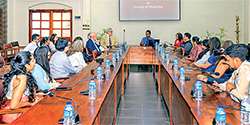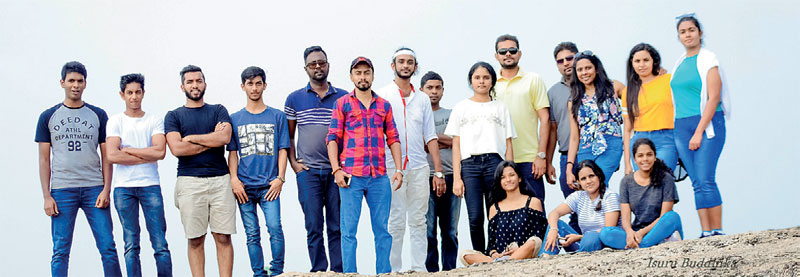Rebuilding the Business Landscape in a Post-Covid Era
The year 2020 has no doubt been, and will probably continue to be known as one of the most challenging years that this century has ever faced and this too, not only for all Sri Lankans but globally as well. From around the end of 2019 and up to now, the world gradually got acquainted with the Covid-19 pandemic and began to deal with its aftermath in one way or another. Amongst those that have been greatly affected, where the business communities, small and large alike. Businesses have suffered and continue to face many hurdles while trying to remain afloat. With a brand new year just around the corner, businesses can once again look forward to growth and change. In order to move past these hurdles and recover from the remnants of the pandemic, businesses should begin to look into a few areas that could help towards bringing about a more optimistic outlook to running a business in this day and age.
Harnessing an Entrepreneurial Mindset
Perspective from both sides; that of the business owner and the customer, evolves over time. Businesses had learned to look at their establishments from a consumer lens and aim to create a more customer-centric approach to doing business. With the onset of the pandemic, many companies and service providers adapt to the situation. When the lockdown occurred, many businesses that probably did not offer delivery services at one point, began to deliver goods and produce to their customers and many small-scale and even some large-scale businesses that were not accustomed to the practice embraced it and went along with it.
When obstacles in the business world emerge, business owners and those involved need to have an open mind and invite ideas and innovation that would support the creation of more sustainable results. Embracing an entrepreneurial mindset is about creating a business with purpose as well as forming a path towards adapting to that situation at hand in an effective manner. Large scale companies, on one hand, follow best practices where they learn from a crisis situation, where they have these findings documented and eventually, are absorbed into their planning processes in the long run.
They have their contingency plan prepared. When the second covid-19 wave arrived, however, small businesses were hit even harder as many of these establishments might not have anticipated such an outcome the second time around. So, small and medium scale businesses should begin to put their learning to practice. From a marketing point of view, consumer behaviour has changed following the pandemic. Today, they tend to focus on gaining more value from their transaction when compared to how they shopped pre-covid. Consumers would want to know how you, as a business entity, can help them solve a problem. It is important now that more focus is projected towards identifying customer pain points and working to establish solid solutions for those. One can also embrace this situation as a catalyst for change in a way. So, the point to be considered is to take another look at consumer behaviour.
Post-Covid Behavioural, Organisational, and Social Changes
With the world moving forward in the midst of a pandemic, we need to look at the prospect of embracing behavioural, organisational, and social changes that have taken shape since the pandemic struck. In terms of organisational and behavioural change, businesses would need to focus on the aspect of trust when it comes to their employees and workforce. This topic would largely focus on employees who have shifted from their offices to work from home. Once again, the pandemic managed to disrupt our work processes in such a way, that many businesses and employees have rediscovered their work trajectories from an entirely new perspective.
At one point, an office framework meant that employees were visible, an interaction was easier and leaders/managers were able to make contact easily with their employees. Now, the work-from-home aspect only allows for the work outcome to be seen. So, not only do organisations need to trust their employees to do their jobs but employees on the other hand, would need to make sure that they are trustworthy among their superiors. So, this element of trust today has become even more valuable than ever. Hiring practices would also face many changes so, organisations should be ready to adapt to the many changes that may emerge in the process.
For instance, one sector that has been heavily stressed out from these recent changes in the IT sector. With the pandemic having had pretty much paved the way for a more online presence, the IT sector would not have expected this type of demand where entities such as education, communication and video conferencing, etc. have all progressively shifted online. So, the pressure on the IT sector is definitely greater than it has ever been. Therefore, these sectors need to take another look into their business models and project future changes into their practices.
In terms of social changes, not only have businesses been affected but so has that of the general public. From a marketing point of view, marketing budgets should not be completely overlooked in favour of the current situation but should continue to engage in instigating marketing strategies that would ensure their product or brand that is still out there in the market. The way marketing is done could go through changes in tandem with the target market and the current economic climate, but it should not come to a complete halt or linger on a zero budget. The business should continue to build on its pipeline.
An Ideal Climate to Advance Inclusivity
There was a time when working mothers ended up sacrificing their careers so that they can stay home and focus on their children, spouses, and households. Today, at-home mothers have the opportunity of working from home. Organisations now have an even better opportunity to practice inclusivity and equal opportunity and to exploit this paradigm shift. At the same time, individuals who bear the brunt of facing social challenges can also receive a chance to be based at home and work for an organisation that easily adapts to such change. Such individuals could be those who are differently-abled, persons from LGBTQI communities who many a time face difficulties in securing traditional office jobs simply because of the way they look or sexual orientation, and even senior persons and retirees who are still capable of working. So, with each passing year, economies grow, obstacles and challenges come and go and businesses adapt and evolve. The year 2021 will no doubt herald a time of unique adaptability for Sri Lankan businesses across all major and minor sectors. The best way forward is to continue to learn from the moment, find solutions to lingering issues, and keep going forward.
Roshan Fernando - President, SLIM









































.jpg)
.jpg)
.jpg)
.jpg)
.jpg)
.jpg)
